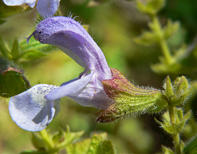Sage (Salvia officinalis) is a perennial shrub with fragrant grey-green leaves about 60cm high in the family of Labiatae / Lamiaceae. It prefers the Middle East and Mediterranean areas, but today has been naturalized throughout the world, including South Africa.

Here in South Africa, the Afrikaans name ‘blou blom salie’ refers to Salvia africana-caerulea (or blue mountain sage).
Blue mountain sage prefers alkaline, rocky soil and grows up to 2m tall. Itis often planted for its decorative qualities - if kept pruned. Salvia africana-caerulea is easy to grow it in full sun in well-drained soil (can withstand mild frost) and is propagated by seed or cuttings. Notable plantings (cultivated from cuttings) are in Porterville in the Western Cape.
Benefits of Sage and Sage Oil
Sage was one of the first plants to be used medicinally by the Dutch at the Cape, who used it instead of Salvia officinalis. A remedy was made by mixing S. africana-caerulea tea with Epsom salts and lemon juice to treat stomach troubles, including colic and diarrhoea.
Sage leaves were used by the Khoi to treat female problems and chest ailments. Used since antiquity, sage was listed in the Ebers Papyrus (1500 BC) as a remedy for itching and followers of Hippocrates (a Greek physician who lived around 40 BC) praised its beneficial effects on menstruation.
Other traditional applications include sage as a herb in cooking and a tea used to treat mild heartburn, sore throats, excessive sweating and dementia. Recent studies seems to confirm sage as a possible herbal remedy for Alzheimer’s disease. As a poultice, it is used for sprains, swelling and bleeding. S.officinalis can be used to treat disorders including seizure, ulcers, gout, rheumatism, inflammation, dizziness, tremors, paralysis, diarrhea, and high blood pressure.
Recently, Sage has been a subject of intensive studies to find new biological effects. These findings include anticancer, anti-inflammatory, antinociceptive, antioxidant, antimicrobial, antimutagenic, antidementia, hypoglycemic, and hypolipidemic effects.
Blue mountain sage essential oil is produced in South Africa. The demand - local and international - is still small, but growing. The plants are harvested during flowering, using the entire plant (cutting it at about 20cm from the base) where after it is steam stilled.
Medical Disclaimer
Information is for educational and informational purposes only and may not be construed as medical advice. The information is not intended to replace medical advice or treatment offered by healthcare professionals.By Marinda Louw
For bulk or Sage Oil export enquiries please use the enquiry link below.